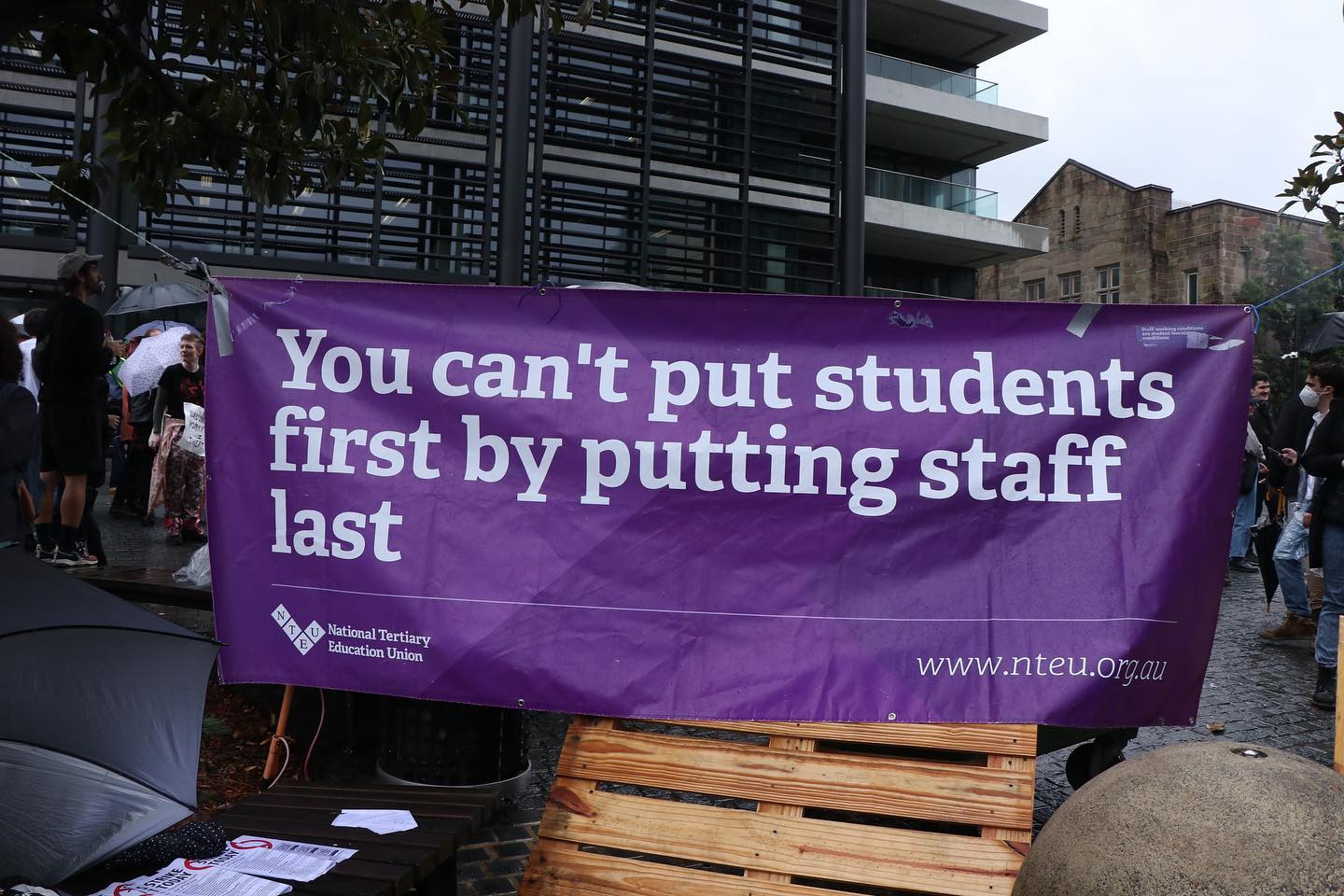“No cuts, no fees, no corporate universities!”
I hear the shouts of protesters as I begin the familiar walk from Abercrombie Street to Eastern Avenue, accompanied by the stomping of feet and the banging of makeshift drums – audible even from the shady backroads near Codrington Street. Unconsciously, my footsteps match the rhythm of strikers’ chants.
“One, two, three! Fuck the VC!”
Soon, I’m greeted with a flurry of bright purple banners as I come upon the crossing on City Road, tied down to temporary fences which blockade this entrance. Rain-flecked strikers wave flags and hand out flyers.
Peter Chen, who spent last Wednesday and Thursday overseeing the City Road/Eastern Ave checkpoint as a picket captain, claims an overwhelming victory for strikers this week.
“We’ve won this strike” he proudly asserts, “because we’ve succeeded in bringing together a community to support the NTEU’s cause. The University’s bargaining team have dragged this out long enough, and we want to be heard and recognised.”
Also at the City Road/Eastern Avenue picket line are two USyd staff members who, out of serious concern for their employability, chose to provide comments anonymously. One of them, a member of the Science faculty, describes the impact of both COVID and casualisation on their employment and mental wellbeing.
“There hasn’t been any support from the University for teaching staff during the transition to online learning. We were just dropped in the deep end and expected to navigate this new terrain ourselves,” he says. “Then, we were hit with huge rates of casualisation and wage theft.”
Another striker from the School of Mathematics joked that he enjoyed working from home as he didn’t have to interact with University admin as frequently. “Work got better for me because I didn’t have to deal with them as often,” he tells me with a laugh. “It’s a tough situation for academics. When a University axes its personnel and introduces such drastic cuts in funding, how are we expected to carry on as if everything is normal?”
However, there were certainly some scenes of friction punctuating last week’s industrial action. The disproportionate police presence at particular picket lines drew heavy criticism, resulting in a number of confrontations between picketers and the police.
The University even went so far as to issue a condemnation of “the use of violence and intimidation to uphold picket lines” in a campus-wide email last Wednesday.
While the NTEU and its supporters take this action and their cause very seriously, there appeared to be some attendees committed to bringing some small measure of levity and humour to the situation. Notable among them is a USyd student – preferring to remain anonymous – dressed as the Tolkienian wizard Gandalf and wielding a magical staff. Standing guard over the entrance to the Abercrombie Building, I’m met with a proclamation of “you shall not pass! … into the ABS.”
Joining in this light-hearted spirit is a group of students who spent the week prior adorning Eastern Avenue and other areas of campus with strike-friendly affirmations and humorous chalk art. “Hot ppl support strikes” and “Gorgeous gorgeous girls join the picket line”, they read.
Notably present at this week’s picket lines is a contingent of First Nations’ staff and students. I speak with a Yuin man at the City Road picket line, who was accompanied by his young daughter.
“I brought her to make a statement” he explains, “that better wages and better job security means a better future for kids like her.” Together, the City Road contingent embody the old adage, ‘it takes a village’, juggling both striking and wrangling a toddler.
As I make my way around to the picket line outside the Higher Degree by Research (HDR) Admin Centre, blockaded by leather-clad members of USyd’s Socialist Alternative, the heavens open and release a biblical torrent of rain. Stupidly forgetting to bring an umbrella (or any wet weather clothing, for that matter) I take shelter with Alma Torlakovic, an employee at the Centre and a branch member of the NTEU. She provides me with some valuable insight into the decision-making processes in the leadup to the strike, and shares her thoughts on the significance of this week’s industrial action. She also generously loans me a poncho.
“Today’s strike action is incredibly powerful,” she tells me. “It means confirmation of union policies and support for its members.” She adds, “we are fighting for what is right – job security, stable wages, and an end to the University’s trigger-happy policy when it comes to casualisation of staff.”
Alma also says she feels affirmed and empowered at seeing “so many people from such diverse backgrounds coming to support the strike”. She talks about the lack of visibility in Australia for unions and strikes.
“There isn’t enough mainstream coverage or visibility for those who take industrial action in this country. Most of the time, union members will simply stay home to strike. Striking at home isn’t enough. We need to be forming picket lines. We need to be seen and heard and recognised.”
Picketers say that unless they see a change in attitude from the University at the bargaining table, the picket lines are set to re-form on 24 May (Week 13) to support the rights of First Nations’ staff.





